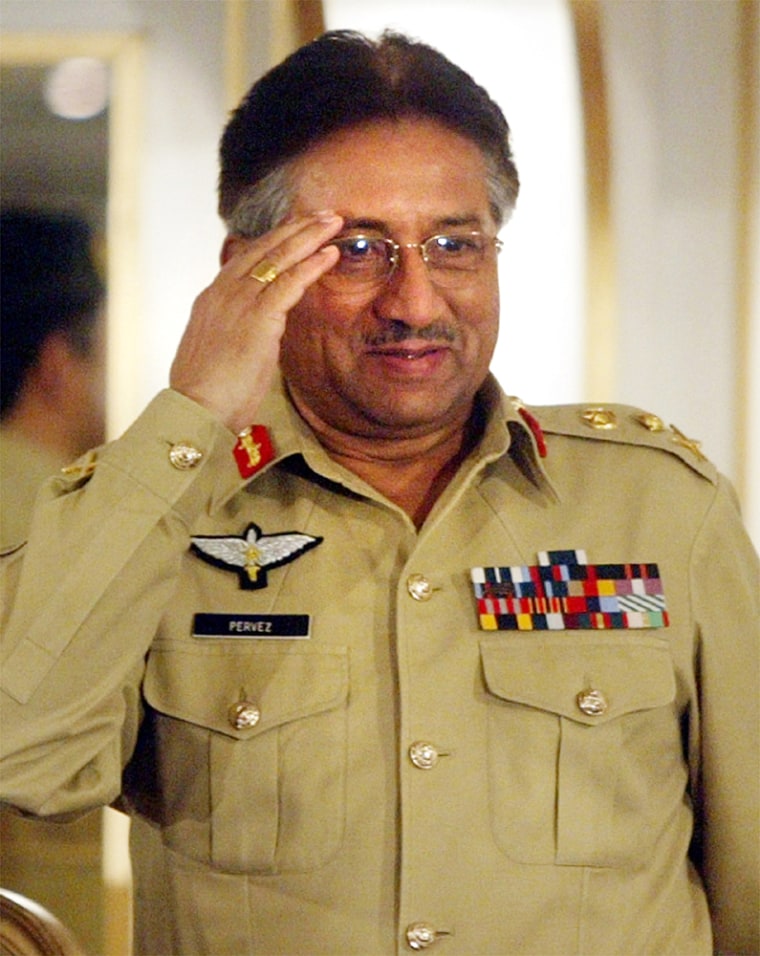Pakistan’s Senate on Tuesday gave final approval to constitutional changes that grant President Gen. Pervez Musharraf extraordinary powers in return for his promise to step down as army commander by the end of 2004.
The legislation — approved by the house on Monday after a surprise deal between the U.S.-backed president and a virulently anti-American Islamic political bloc — will now go to Musharraf’s desk for his signature. Officials say he is expected to sign it immediately.
Supporters say the deal is an important step on the path back to democratic rule after Musharraf ousted a civilian government in a 1999 coup. Critics insist the deal, which amends the constitution to give the general the power to sack the prime minister and disband parliament by decree, simply is further window-dressing on what is essentially military rule.
Musharraf's power expanded
“The parliamentary system has been disfigured because of this amendment,” said Sadique al-Farooq, a spokesman for the Pakistan Muslim League of former prime minister Nawaz Sharif. “All important powers have been transferred to the president, the prime minister will be rendered powerless and the parliament will become a rubber-stamp.”
The Senate, dominated by Musharraf’s ruling PML-Q party, voted 72-0 to approve the amendment after the opposition walked out. The bill passed the house by a vote of 248-0 on Monday, with nearly 100 opposition lawmakers staying on the sidelines in protest.
The main opposition, Alliance for Restoration of Democracy (ARD), said Islamic parties had once again proved themselves to be allies of the military, as they have often been in the past.
“It is a black day in Pakistan’s history because parliament has circumvented its own powers,” said Senator Raza Rabbani, a senior ARD leader. “The parliament, prime minister and the cabinet have surrendered their powers to a single man,” he said.
Under the agreement with the Mutahida Majlis-e-Amal, or MMA, Musharraf has until Dec. 31, 2004 to leave the army post, the main base of his power. He will remain on as president until his 5-year term expires in 2007.
He must also undergo a vote of confidence in the federal parliament, as well as regional assemblies. Information Minister Sheikh Rashid Ahmed said such a vote should take place this week, possible as early as Thursday.
The vote is seen as a formality, as the Islamic coalition’s backing gives Musharraf enough legislative support to win.
Deadline for deal is regional summit on Sunday
The government would like the matter resolved ahead of a key regional summit to be held in Islamabad starting on Sunday. The summit will bring together the leaders of seven South Asian nations, including India. It is seen as an historic opportunity for Pakistan and India to cement recent peace overtures.
The general has become a key ally in the U.S. war on terrorism, backing American military action in neighboring Afghanistan and arresting more than 500 al-Qaida suspects in his own territory.
The bill ended a yearlong stalemate that had paralyzed Parliament. Opposition legislators — led by the MMA — had blocked most debate since late 2002, shouting down speakers, banging on their desks and holding walkouts.
The vote comes on the heels of two separate assassination attempts against the 60-year-old leader.
